|
|
|
Sort Order |
|
|
|
Items / Page
|
|
|
|
|
|
|
| Srl | Item |
| 1 |
ID:
151280


|
|
|
|
|
| Summary/Abstract |
This research note discusses a five-year examination of the original coding work of the Militarized Interstate Dispute (MID) project. After strictly applying MID coding rules, we recommend dropping 251 cases (or over 10% of the dataset), as either we were unable to find a militarized incident in the historical record or the dispute appeared elsewhere in the data. We found evidence linking 75 disputes to other cases, and we could not identify 19 cases in the historical record. Among the remaining disputes, we recommend major changes (changes in dispute year, fatality level, and participants) in 234 disputes and minor changes in 1,009 disputes. We use this article to examine the potential impact of our suggestions on existing studies. Though we identified several systematic problems with the original coding effort, we also find that these problems do not affect current understandings of what predicts the onset of interstate conflict. However, estimates in our replications of three recent studies of dispute escalation, dispute duration, and dispute reciprocation all witness substantial changes when using corrected data—to the point of reversing previous conclusions in some cases.
|
|
|
|
|
|
|
|
|
|
|
|
|
|
|
|
| 2 |
ID:
151281
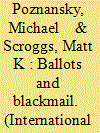

|
|
|
|
|
| Summary/Abstract |
Does the restraint that prevents pairs of democracies from fighting large-scale wars also prevent them from coercing one another? While scholars have long drawn a bright line between using force and threatening it, the literature on democratic-peace theory overwhelmingly emphasizes the former. Using a dataset uniquely suited for the study of militarized compellent threats, we find that pairs of democracies are significantly less likely to engage in coercive diplomacy than are other types of regimes. We employ a variety of estimators to ensure the robustness of our results; the finding holds in all cases. We also elaborate on several alternative logics that might account for the hypotheses. This allows us to adjudicate between a variety of mechanisms. Our findings reveal that democratic-peace theory has broader applicability than even proponents give it credit for: not only are democracies less likely to fight wars with one another, but they also prove less likely to threaten each other with force.
|
|
|
|
|
|
|
|
|
|
|
|
|
|
|
|
| 3 |
ID:
151285


|
|
|
|
|
| Summary/Abstract |
Many observers see mutual distrust as a major reason for increasing tensions in East Asia, but few studies systematically explore exactly how trust, or the lack of it, influences international cooperation in the region. We examine the microfoundations of international trust in East Asia by analyzing an original survey of Chinese urban residents’ attitudes toward Japan and South Korea. We find that generalized trust, or the belief that other nations have benign intentions, provides the most important driving force of trust toward Japan and South Korea. This, in turn, has a positive effect on preferences for interstate cooperation. We also find that, contrary to conventional wisdom, nationalism and historical memory have little or no effect on international trust. Our analysis enhances our broader understanding of international trust by clarifying its sources and consequences. It also suggests some important policy implications for Sino–Japanese relations and Chinese foreign policy.
|
|
|
|
|
|
|
|
|
|
|
|
|
|
|
|
| 4 |
ID:
151283
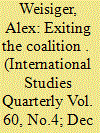

|
|
|
|
|
| Summary/Abstract |
When do countries abandon coalition partners during war? Prominent arguments about alliance dissolution focus on peacetime, yet the ability of alliances to influence international politics ultimately hinges on their cohesion or dissolution during war. In this article, I argue that battlefield circumstances heavily influence the likelihood of defection from coalitions. First, countries fighting independently from their partners make attractive candidates for wedge strategies and hence are more likely to defect. Second, coalitions are more likely to collapse when their members see victory in the overall war as less likely. These predictions contrast with common expectations from theories of the balance of power and of collective action. I test hypotheses about wartime developments statistically using new time-varying data on both front-level troop contributions and battle deaths. Consistent with theoretical predictions, countries are more likely to abandon coalition partners if fighting alone and when the coalition fares worse in recent fighting.
|
|
|
|
|
|
|
|
|
|
|
|
|
|
|
|
| 5 |
ID:
151278


|
|
|
|
|
| Summary/Abstract |
We analyze how one of the central drivers of globalization, foreign direct investment (FDI), relates to the prevalence of corruption. According to received wisdom, the link between globalization and corruption depends on the presence of proper political institutions and practices. We develop an alternative explanation that looks at the effect of inward FDI on host market dynamics, which in turn affect the opportunities for rent creation. We argue that, in less developed countries, FDI inflows can increase market concentration, resulting in higher rents that public officials can demand from market actors. Yet, the positive association between inward investment and corruption is mitigated in more developed economies. There, foreign entry into a market populated by productive indigenous firms promotes competition and reduces rents. This lowers opportunities for corrupt behavior. We test this nonlinear relationship between FDI and corruption in an instrumental variable two-stage least squares setting. The results indicate that FDI is indeed associated with higher levels of corruption in less developed countries, but not in developed countries. Our findings highlight the role of globalization in shaping host countries’ market dynamics, which often set the parameters of political outcomes.
|
|
|
|
|
|
|
|
|
|
|
|
|
|
|
|
| 6 |
ID:
151276
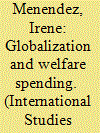

|
|
|
|
|
| Summary/Abstract |
What explains variation in the relationship between globalization and public spending on compensation across countries? This article argues that the effect of trade exposure on compensation depends on economic geography and electoral institutions. It predicts that trade leads to greater compensation when trade losers are concentrated geographically and politicians have incentives to target specific constituencies. Policy proves least responsive where electoral districts are large and losers are concentrated. Moreover, in systems with small electoral districts, trade increases compensation when losers are concentrated relative to where they are dispersed. In systems with large electoral districts, trade increases compensation only when losers are dispersed. I evaluate these claims by using a panel of 14 developed democracies and a new measure of concentration. The results provide robust support for the argument. The implication is that there is no generalized relationship between globalization and spending. Rather, the welfare effects of globalization are shaped by fundamental considerations of political economy, such as geography and electoral institutions.
|
|
|
|
|
|
|
|
|
|
|
|
|
|
|
|
| 7 |
ID:
151274


|
|
|
|
|
| Summary/Abstract |
Debates about the ethics of humanitarianism increasingly recognize the significance of faith-based organizations in the provision of aid. Critics charge that the primary problem with faith-based groups, especially Christian organizations, is their propensity to proselytize. We agree that proselytism is problematic. However, we argue that the focus on religious agents alone indicates a secularist presumption and lack of knowledge about the complexity of religious ethics that a) tend to mask significant differences among Christian groups in their ethics of aid, and b) prevent scholars from addressing an additional form of undue pressure in aid provision. We call this undue pressure “donor proselytism.” Our interviews with Christian groups in Europe, sub-Saharan Africa, and the United States demonstrate the contestation among Christian humanitarians about what constitutes proselytism. Our interviews and NGO conference observations also show how donor pressures shape aid to conform to neoliberal conceptions of efficiency, sustainability, and measurable results. Ultimately, we assert that donor proselytism is in fact the more pervasive of the two. Both scholars and policymakers, therefore, should take into account the complexity of religious ethics regarding proselytism as well as the power of donor proselytism to affect the lives of those receiving humanitarian assistance.
|
|
|
|
|
|
|
|
|
|
|
|
|
|
|
|
| 8 |
ID:
151273


|
|
|
|
|
| Summary/Abstract |
Non–legally binding agreements provide an important tool for establishing international cooperation. We know little, however, about the variation in the implementation of such agreements. This article identifies a major cause of this variation: legal tradition. Nonbinding agreements, which may be adapted to local needs and circumstances, are consistent with the gradual, organic evolution of common law; by contrast, they are an uneasy fit with the civil-law tradition that neatly distinguishes between “law” and “nonlaw.” Consequently, common-law countries are more likely to implement nonbinding agreements than civil-law countries. Survival analysis of three nonbinding instruments—United Nations model laws aimed at harmonizing commercial legislation—finds strong support for this argument: common-law countries prove significantly more likely to implement these model laws.
|
|
|
|
|
|
|
|
|
|
|
|
|
|
|
|
| 9 |
ID:
151284
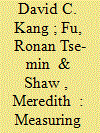

|
|
|
|
|
| Summary/Abstract |
How much war was there in early modern East Asia? This article empirically corroborates characterizations of relations between Sinic East Asian polities as being unusually peaceful and stable, which we attribute to the participants’ shared subscription to a common and accepted hierarchy framed by a Confucian worldview. More broadly, we provide direct empirical evidence that international hierarchies derive their stability from cultural consensus rather than simply asymmetries in material power. We make these claims by addressing the extent, range, and patterns of war in early modern East Asia by introducing and describing an extensive dataset of over 1,100 entries that measures war and other violence in early modern East Asia from 1368 to 1841 and relies principally on both Chinese and Korean language sources. The combination of these two Asian language sources forms the basis of a unique dataset that will substantially widen and complement the largely Chinese or English language sources that are generally used in debating war in early modern East Asia. Asia was composed of much more than simply China, and bringing in scholarship from other areas of early modern East Asia reflects a trend of moving past national studies to research the region more holistically.
|
|
|
|
|
|
|
|
|
|
|
|
|
|
|
|
| 10 |
ID:
151286
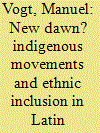

|
|
|
|
|
| Summary/Abstract |
This article investigates how indigenous movements in Latin America promote the political inclusion of historically marginalized indigenous groups. I argue that the social pressure produced by a strong movement promotes the inclusion of indigenous representatives in formal leadership positions. However, this effect depends on both the movement’s internal unity and the general responsiveness of the political system. I examine my claims using a mixed-methods design. I draw on a new group-level data set on ethnic parties and ethnic civil society organizations in Latin America between 1946 and 2009. My statistical analysis finds that indigenous groups with well-organized movements are more likely to achieve inclusion in executive positions of state power. The level of democratic freedom in a country greatly conditions this effect, while movement-internal factionalism undermines the political effectiveness of indigenous mobilization. I illuminate the causal mechanisms underlying these results in a case study of the rise and decline of indigenous mobilization in Ecuador.
|
|
|
|
|
|
|
|
|
|
|
|
|
|
|
|
| 11 |
ID:
151272


|
|
|
|
|
| Summary/Abstract |
In recent years, international third parties have increasingly sought to manage the dire consequences of civil war, often by deploying peacekeeping operations. However, peacekeepers sometimes face deliberate attacks by armed groups. These attacks hamper efforts to provide humanitarian relief and security. This raises a critical question: what factors lead rebel groups to target peacekeepers? We argue that internal conflict dynamics are important for explaining this phenomenon. Rebels attack peacekeepers as an alternative strategy to undermine incumbent regimes. They adopt this strategy as the balance of power turns against them in their struggle against governments. We evaluate our argument using a novel event data set on violent attacks on peacekeepers in sub-Saharan Africa from 1989 to 2009. We find a positive relationship between rebel losses and violent attacks on peacekeepers. These findings hold when controlling for mission-specific characteristics, time-invariant unobserved heterogeneity, and across different model specifications.
|
|
|
|
|
|
|
|
|
|
|
|
|
|
|
|
| 12 |
ID:
151275


|
|
|
|
|
| Summary/Abstract |
How do governments distribute their foreign aid resources across international development organizations (IDO)? We argue that governments’ distributional choices across IDOs derive from their attempt to minimize the costs of delegation and to pursue their own interests in foreign aid policy. Governments make decisions about the allocation of resources across a large number of IDOs, and they delegate their scarce aid resources to IDOs that pursue development policies in line with their own foreign development interests. We use data on the financial contributions of 22 OECD governments to 12 IDOs from 1970 to 2008 to test our argument. We find strong support for our claims. Governments regularly contribute to a large number of IDOs, and they tend to delegate more resources to IDOs that provide higher levels of portfolio similarity. The findings suggest that governments can benefit from the increasing complexity of the system of international organizations. It allows them to minimize the loss of control they experience when delegating sovereignty to international organizations.
|
|
|
|
|
|
|
|
|
|
|
|
|
|
|
|
| 13 |
ID:
151271


|
|
|
|
|
| Summary/Abstract |
Civil wars often feature insurgent groups with external sponsors. Yet, we know little about the impact of such sponsorship on insurgent cohesion. Indeed, researchers disagree about the conditions under which state sponsorship encourages or discourages organizational splits. This article presents a theory that reconciles these disagreements. I focus on how the allocation of external resources affects the intra-group distribution of power between rebel leaders and their internal rivals. Sponsors that help maintain an imbalance of power in favor of the leader foster cohesion; those that help flip the imbalance in favor of a rival increase the likelihood of an internal coup within the group. Only when sponsors contribute to a shift from an imbalance of power to balanced power is the rebel group more likely to split into competing organizations. I further argue that sponsors reallocate their resources in favor of a rebel leader’s internal rival in order to punish the leader for undesired behavior. Case studies of two major insurgent groups—the Sudan People’s Liberation Movement/Army and the Lebanese Hezbollah—illustrate the explanatory power of my argument.
|
|
|
|
|
|
|
|
|
|
|
|
|
|
|
|
| 14 |
ID:
151279


|
|
|
|
|
| Summary/Abstract |
Preferential trade agreements (PTAs) constitute the most rapidly growing form of trade liberalization in the global economy. In contrast to, for example, the World Trade Organization, PTAs allow for discrimination among potential partner countries. This helps explain their proliferation. But it also raises an important question: which countries are preferred partners for PTAs? On the presumption that public opinion matters—both normatively and analytically—for trade policy, we study what types of countries citizens prefer for PTAs. We focus on developing countries, as they both play an increasingly important role in the expanding global network of PTAs and also remain understudied in the literature on international cooperation and trade policy. To account for the multidimensionality of PTA partner country choice, we develop and test a theoretical framework through conjoint experiments embedded in national surveys in Costa Rica, Nicaragua, and Vietnam. The results show that, despite starkly divergent national contexts, citizens in all three countries opt for similar partner countries. Respondents prefer culturally similar countries, democracies, and countries that maintain high environmental and labor standards. Somewhat surprisingly, economic size and geographic distance prove less important in the choice of which countries to support as PTA partners.
|
|
|
|
|
|
|
|
|
|
|
|
|
|
|
|
| 15 |
ID:
151270


|
|
|
|
|
| Summary/Abstract |
Why do most civil wars occur in a relatively small number of countries? We answer this question by analyzing how civil wars diffuse in multiethnic states. Our theory outlines two motivation and two opportunity mechanisms that trigger additional ethnic rebellions in the same state. First, ongoing civil wars motivate members of other ethnic groups to mobilize in reaction to the negative externalities of nearby conflict. Second, ethnic groups emulate nearby rebel groups as a means of addressing preexisting grievances. Third, fighting multiple civil wars drains state capacity, opening the door for additional challengers to rebel against the government. Finally, long-lasting civil wars signal that the state is unable to defeat active rebels, thus creating incentives for new challengers to take up arms. We test our mechanisms in all multiethnic states with a history of armed conflict between 1946 and 2006. Using Geographic Information Systems, we construct overlap and minimum distance measures between ethnic groups’ settlement patterns and conflict zones. Our statistical analysis indicates that new ethnic civil war onsets are more likely in the vicinity of ongoing armed conflicts. Ethnic civil wars also diffuse as governments face an increasing number of rebels and longer rebellions.
|
|
|
|
|
|
|
|
|
|
|
|
|
|
|
|
| 16 |
ID:
151282
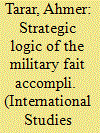

|
|
|
|
|
| Summary/Abstract |
When trying to change the status quo in their favor, leaders sometimes launch sudden faits accomplis involving the costly, but limited, use of military force. In doing so, they hope that the potential defender accepts the consequences and does not pursue further military conflict. But comparatively little scholarship tries to explain the use of this strategy. I examine the logic for engaging in a fait accompli from within the rationalist bargaining approach to understanding costly military conflict. My analysis identifies informational and commitment problems that can cause a leader to undertake a fait accompli, as well as an informational problem under which the fait accompli can trigger an unwanted war with the potential defender. My model also applies to dilemmas of extended deterrence; it provides some new insights into this area as well. Overall, it helps explain wars that are not preceded by crisis bargaining.
|
|
|
|
|
|
|
|
|
|
|
|
|
|
|
|
| 17 |
ID:
151277
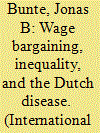

|
|
|
|
|
| Summary/Abstract |
The theory of the “Dutch Disease” predicts that income from oil and other natural resources produces negative economic consequences through two different mechanisms. The “Resource Movement Effect” suggests that workers leave manufacturing for higher-paying jobs in other sectors. The “Spending Effect” implies that spending resource wealth domestically leads to exchange rate appreciation. The combination of these processes results in the contraction of the export sector. This article explores how, and why, a country’s institutions may prevent the Dutch Disease before it starts. Incorporating insights from the “Varieties of Capitalism” literature, I find that the Dutch Disease is significantly less severe in countries with a high degree of wage bargaining coordination and with low income inequality. The former interrupts the Resource Movement Effect as it limits workers’ incentives to move out of the tradable sector. The latter moderates the Spending Effect because it prevents appreciation of the real exchange rate.
|
|
|
|
|
|
|
|
|
|
|
|
|
|
|
|
|
|
|
|
|